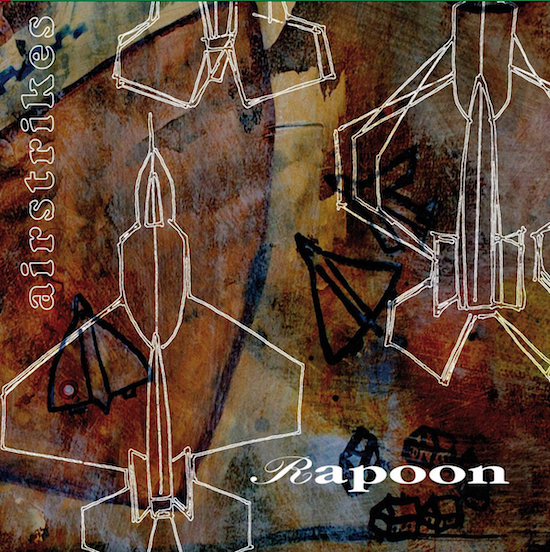Airstrikes bears artistic witness to a parade of weaponised technology and terminology, often featuring an eerie female-register speech synthesizer reading the litany of anonymous death from above with all the bland affect of a call-centre robot. Storey is immersed in the ponderous unwinding rhythms and, as ever with Rapoon, there’s as much dub as there is electronica and a healthy dose of non-western tones and atonal structures at play here. “We pray for rain,” notes the inhuman voice on the track of the same name, unhurried and emotionless as an automated bus-stop announcement. The intricate percussion ramps up the emotional content among dusty sounds that heave with the dry rasp of terminal decline.
As is to be be expected, there’s much talk of, and the sound of, drones here – especially on ‘Drones’. A news report outlines their deployment around the Middle East and beyond as angry voices clamour over the steady beat of a world that keep on turning and a keening, rather Vangelis-ish swoon. Mournful and haunted, Airstrikes reflects and refracts the sound of a media-saturated society where news of low-intensity warfare never ends and the civilisations supposedly clashing might as well be called Oceania, Eurasia and Eastasia.
But with Rapoon, while the political content might be high, the musical mission is equally important. Storey uses rhythm to buzz and unsettle the listener, drifting between the hazy percussive string-strikes of ‘Whisper In The Suk’ and the frenetic woven beats of ‘Airstrikes (Fake News)’ that flit across the stereo image like waves of lethal pilotless aircraft.
Storey’s take on beats and atmospheres lies somewhere between the emotive lighter-than-air exoticism of Dead Can Dance and the dense fug and harsh repetition of Muslimgauze, with their abstracted outsider version (and versioning in the dub production sense) of non-specific Middle Eastern music and atmosphere as heard through a western cultural filter. Rapoon is unlikely to be mistaken for either, however, and Storey has honed his sound into one that largely avoids the obvious pitfalls of ethnodelic orientalism simply by never suggesting that his charged approach to musical borrowing is anything but a construct (neither, to be fair, did Muslimgauze).
As with Muslimgauze, Rapoon deploys samples of environmental recordings, voices and music, not merely to add colour but to evoke a particular geopolitical landscape. Airstrikes is quite capable of transporting the listener to a place and state of being that effects a psychogeographical shift as much as it delivers a political statement. Perhaps more importantly, Airstrikes can groove. The bass swirls and hovering drones (of the audio kind) intertwine with intricately sequenced constructions that propel the repetitive beats in hypnotic spirals. Subtly evolving loops are populated with a ghostliness that nods – thoughtfully and sedately – to both dub reggae and the engrossing hypnotic spiral architectures summoned by the likes of Carter Tutti.
“We watch and wonder,” intones the speech synth while delicate dulcimer percussion flutters among backwards voices and deep-drawn sample loops on the final third of an hour-long track. “Our small lives are so short… We will never know.” And Rapoon leads the way, onwards and outwards, on waves of uncoiling ambience.


